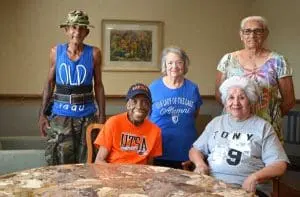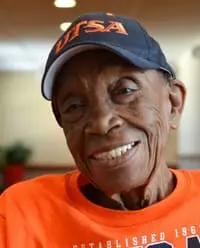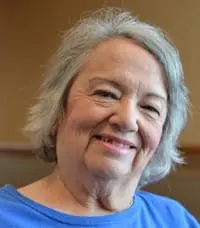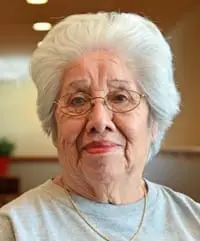[vc_row][vc_column][vc_column_text]

Where two long corridors meet in a second-floor corner at Casitas de Villa Corona, Jonas Vikta’s table beckons in the morning light. As does Miss Eddie.
“Come on, sit down,” she says to a couple, Simon and Cecelia, as they approach down one of the vinyl-floored corridors.
They join her, and in minutes, a half-dozen residents are sitting around the granite-topped table, talking and laughing over doughnuts and coffee. Their discussion ranges from health, plants, art and the Spurs to the likable, mysterious man and neighbor they call Mr. Jonas, who died in 2018 at the age of 94.
They also talk about the legacy of the table he bequeathed to them and its power in creating community.
“That table brings a lot of people together,” says Eva. “I never thought it would do that. But the table has something real special about it. All of a sudden, it was being utilized by the complex. Before it was just the two chairs.”
“Yeah, just the two chairs,” says Angela. “And that plant,” says Miss Eddie.
“But very few people did sit here,” says Eva. “Once the table was established, people decided to join in.” “Even bringing in their own chair,” says Miss Eddie with a big laugh.

Jonas lived for four years at Casitas de Villa Corona, where he was known, in Eva’s words, as “a jack-of-all-trades.” “He was an artist,” she says. “I didn’t know that until I showed him some of my artwork, and then he brought me to his apartment and I saw all of his artwork. He did oils. It was beautiful.” One of Jonas’ paintings adorns a wall near the table.
Through the Bihl Haus GO! Arts classes, there is a vibrant artistic community at Casitas where being a gifted artist earns one a certain status.
“He came into the community room during the art class every Thursday,” says Eva. “They’d say ‘It’s Mr. Jonas, he’s an artist,’ and as soon as they heard the word ‘artist’ he could have all the coffee he wanted, all the doughnuts. And he’d admire their work.”
Miss Eddie remembers him standing behind her as she painted and mixed her colors. “He’d say, ‘hmmm I used to do that.’” Jonas was also a master gardener known to save a plant or two.
He was multi-lingual. “I’d go to him if I wanted to learn certain words because he knew several languages, and one of them was Russian,” says Eva.
But in sharing his knowledge and talents with the other residents, Jonas never shared enough for them to be certain of the specifics of his life, even where he was born. Some were aware of some connection to the military.
“He told me that when he got out of the military, that’s when he moved to Chicago. ’Cause he was mostly from Chicago,” says Miss Eddie.
Angela says, “He must have done a lot of military in different countries because he was always talking about different countries, Germany, England….”
“….Secret, it was secret,” says Miss Eddie.

“He said something about taking people who were wounded to hospitals. He was trained,” says Eva.
She remembers an unsettling incident that offers a glimpse into the harrowing memories Jonas lived with.
“We’re very close to Lackland and Kelly (Air Force Bases),” says Eva of Casitas’ West Side location. “One day, there was a big plane coming in and you know how they make the noises? Mr. Jonas shouts, ‘We’re being attacked!’ I kept calming him down, ‘No, no, we have an airfield, that’s why.’ He had been at one of those bases out in Ukraine or whatever and he thought we were being invaded. Because he had been to war.”
That war was World War II.
Jonas Viktoravicius was born in 1924 in a village in Lithuania. He became a chauffer for the Red Cross and an ambulance driver in Austria for the United Nations Relief and Rehabilitation Administration, where he’d smuggle people across Austria and Germany.
For nearly 16 years he was with the Labor Service, which was created by the US Army in Europe to employ European nationals. In 1949, Jonas came to the United States by way of the Displaced Persons Commission. On his voyage to America, he worked as a police guard.
He settled in Chicago and in 1954 married Audrone who was also from Lithuania. In June of 1956 they both became United States citizens. Among his jobs was working for Ford Motor Company. Audrone died in Chicago in 2008 and Jonas eventually moved to San Antonio.

At Casitas, residents say he had at least one son and grandson, but they know nothing else about his family.
In March, no longer able to care for himself, Jonas was admitted to a nursing home. But he’d make one final visit to Casitas and the only family he’d known for four years. It was March 29, the day after his 94th birthday. He looked frail and was breathing with the aid of an oxygen tank, but his eyes lit up when his friends sang “Happy Birthday” to him.
He entered his apartment for the last time and began dispersing his possessions, including the granite-topped table with the wooden stand he’d carved.
Jonas Vikta died in June.
“This table has never been used as much as it is now,” says Angela. Looking toward Miss Eddie, she says, “And sometimes we’re teaching her how to play Loteria.”
The six gathered around the table now begin to get up and go back to their rooms. But later in the day and certainly tomorrow, they will be back at the table in the corner where two long corridors meet.
“You never know what a table does towards bringing people together,” says Eva. “You never know.”[/vc_column_text][/vc_column][/vc_row]
